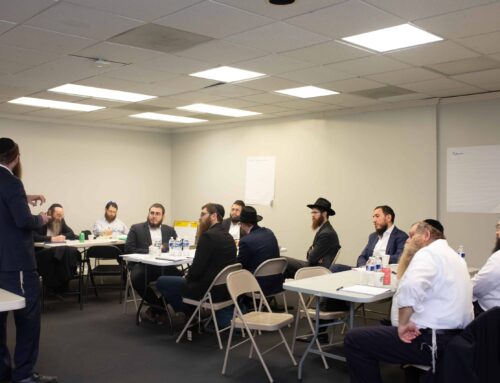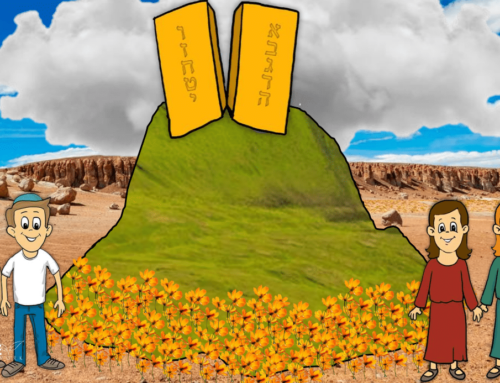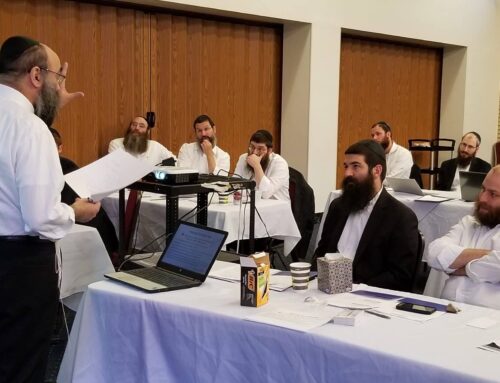 Is covering posuk after posuk all there is to teaching Chumash? Should a teacher skip “dikduk rashis,” or is Rashi really for the “ben chamesh limikra?” Does trop teach us more than just how to lein? What is our goal, really, for teaching Chumash, and how do we make sure it happens?
Is covering posuk after posuk all there is to teaching Chumash? Should a teacher skip “dikduk rashis,” or is Rashi really for the “ben chamesh limikra?” Does trop teach us more than just how to lein? What is our goal, really, for teaching Chumash, and how do we make sure it happens?
These and more were the questions that surfaced at a groundbreaking two day seminar given by the Menachem Education Foundation (MEF) this summer.
Between the men’s event and the women’s seminar two weeks later, close to 100 educators are now thinking very differently about how to teach Chumash.
Presenters Rabbi Yossi Rosenblum, Rabbi Mendy Greenbaum, and Mrs. Sara Rosenfeld modeled new ways to approach the Chumash, based on the Zekelman Standards.
They showed that dikduk makes sense – and makes all the difference in what a posuk is saying, that trop is the Torah’s punctuation marks, and that focusing on core skills will put the keys to independent learning into our students’ hands.
The seminar, called “Unlocking the Chumash,” was based on the Zekelman Standards for Chumash, which specify the skills necessary at every grade level for mastery of 5 areas: 1) Torah Shebichsav Essentials (hashkafa, navigating the Chumash, etc.), 2) Chumash Content, 3) Vocabulary and Language Skills, 4) Posuk Comprehension, and 5) Rashi.
 The Zekelman Standards were developed over a number of years by a team of expert educators with feedback straight from the classroom, under the leadership of the project’s director and principal of Yeshiva Schools of Pittsburgh, Rabbi Yossi Rosenblum.
The Zekelman Standards were developed over a number of years by a team of expert educators with feedback straight from the classroom, under the leadership of the project’s director and principal of Yeshiva Schools of Pittsburgh, Rabbi Yossi Rosenblum.
The project has been supported since its inception by Mr. Alan Zekelman, a visionary philanthropist dedicated to raising the bar in Torah education, in honor of his late parents, Yechezkel ben Avrohom Aharon and Rus bas Avrohom.
While over a dozen Chabad schools on three continents have begun implementing the Zekelman Standards for Chumash, this was the first major initiative to bring the standards to everyone involved in teaching Chumash.
Mrs. Sara Labkowski of Machon Chana generously donated their newly renovated space for the occasion, helping MEF bring this event to the community free of charge.
 This effort brought together educators from across the country, from new teachers to school leaders, and they each left with their very own copy of the standards, a 100+ page packet of sample resources, and much more:
This effort brought together educators from across the country, from new teachers to school leaders, and they each left with their very own copy of the standards, a 100+ page packet of sample resources, and much more:
“I learned things I was never taught in all my years in Yeshiva,” one commented. “The course was an incredible eye-opener, and I am looking forward to implementing what I learned.”
Another pointed out how the actual ‘trop’ tune plays a vital role in explaining the meaning of a posuk to students. “I now realize how much more I could have taught my talmidim,” a teacher said.
MEF’s vision going forward is to make the standards and accompanying resources freely available to educators online, with a team of consultants working with schools to implement them. Ultimately, the project looks forward to seeing a new generation of talmidim and talmidos who are successful at learning in Chumash, have chayus in their Torah study and Yiddishkeit, and have been given the keys to unlock their heritage.
For more information, visit www.mymef.org/programs/standards, email [email protected], or call 718-663-7215.

















